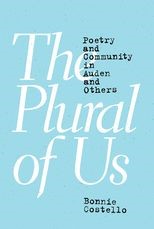 The Plural of Us: Poetry and Community in Auden and Others
The Plural of Us: Poetry and Community in Auden and Others
Contents
-
-
-
-
-
-
The Orators: Auden as Narcissus The Orators: Auden as Narcissus
-
-
-
-
-
-
-
-
-
Cite
Abstract
This chapter begins with a discussion of the plurality of the self. Auden viewed the plurality of the self as an inevitable condition of being and consciousness, and a check to narrow subjectivity and repressive will, rather than a flaw to be overcome. The Double Man (1941) does not decide questions but poses them. Its major poem, “New Year Letter,” offers a dialogue between poetry and prose and between his own words and those he has read. The epigraph cites Montaigne (by way of Charles Williams): “We are, I know not how, double in ourselves, so that what we believe we disbelieve, and cannot rid ourselves of what we condemn.” In many ways, Auden is a modern-day Montaigne, looking at his society by engaging in a dialogue with and about himself—not in the form of idealizing self-love, but rather humble and skeptical self-regard. The remainder of the chapter provides a reading of The Orators.
Sign in
Personal account
- Sign in with email/username & password
- Get email alerts
- Save searches
- Purchase content
- Activate your purchase/trial code
- Add your ORCID iD
Purchase
Our books are available by subscription or purchase to libraries and institutions.
Purchasing information| Month: | Total Views: |
|---|---|
| December 2022 | 2 |
| May 2023 | 1 |
| September 2023 | 4 |
| October 2023 | 1 |
| August 2024 | 1 |
| November 2024 | 3 |
| February 2025 | 2 |
| March 2025 | 5 |


Get help with access
Institutional access
Access to content on Oxford Academic is often provided through institutional subscriptions and purchases. If you are a member of an institution with an active account, you may be able to access content in one of the following ways:
IP based access
Typically, access is provided across an institutional network to a range of IP addresses. This authentication occurs automatically, and it is not possible to sign out of an IP authenticated account.
Sign in through your institution
Choose this option to get remote access when outside your institution. Shibboleth/Open Athens technology is used to provide single sign-on between your institution’s website and Oxford Academic.
If your institution is not listed or you cannot sign in to your institution’s website, please contact your librarian or administrator.
Sign in with a library card
Enter your library card number to sign in. If you cannot sign in, please contact your librarian.
Society Members
Society member access to a journal is achieved in one of the following ways:
Sign in through society site
Many societies offer single sign-on between the society website and Oxford Academic. If you see ‘Sign in through society site’ in the sign in pane within a journal:
If you do not have a society account or have forgotten your username or password, please contact your society.
Sign in using a personal account
Some societies use Oxford Academic personal accounts to provide access to their members. See below.
Personal account
A personal account can be used to get email alerts, save searches, purchase content, and activate subscriptions.
Some societies use Oxford Academic personal accounts to provide access to their members.
Viewing your signed in accounts
Click the account icon in the top right to:
Signed in but can't access content
Oxford Academic is home to a wide variety of products. The institutional subscription may not cover the content that you are trying to access. If you believe you should have access to that content, please contact your librarian.
Institutional account management
For librarians and administrators, your personal account also provides access to institutional account management. Here you will find options to view and activate subscriptions, manage institutional settings and access options, access usage statistics, and more.